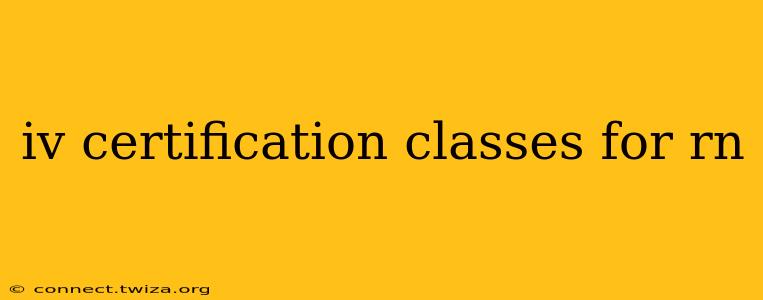Registered Nurses (RNs) seeking to enhance their skills and career prospects often look to IV certification. This comprehensive guide explores various IV certification classes for RNs, addressing common questions and providing essential information for making an informed decision. Whether you're a new graduate or a seasoned professional, understanding the nuances of IV therapy certification is crucial for providing safe and effective patient care.
What are the benefits of IV certification for RNs?
IV certification demonstrates a commitment to advanced nursing skills and patient safety. Holding an IV certification can lead to several advantages, including increased job opportunities, higher earning potential, and enhanced professional credibility. Many healthcare facilities prefer or require nurses with IV certification, especially in specialized units like emergency rooms, intensive care units, and oncology wards. The certification validates your competency in performing intravenous procedures, reducing the risk of medical errors and improving patient outcomes.
What types of IV certification classes are available for RNs?
Several organizations offer IV certification classes catering to RNs with varying levels of experience. These courses often cover theoretical knowledge and hands-on skills training, encompassing topics such as:
- Venipuncture techniques: Mastering various methods for accessing veins, adapting to different patient anatomies.
- Catheter insertion and maintenance: Correct insertion procedures, preventing complications, and managing catheters.
- IV fluid administration: Understanding various fluid types, calculating infusion rates, and monitoring patient response.
- Infection control: Implementing aseptic techniques to minimize the risk of infection.
- Troubleshooting and complication management: Identifying and addressing potential problems like infiltration, phlebitis, and air embolisms.
- Legal and ethical considerations: Understanding the legal and ethical implications of IV therapy.
These classes may range from basic introductory courses to advanced programs focusing on specific areas like pediatric IV therapy or chemotherapy administration. The specific content and duration will vary based on the provider.
How long do IV certification classes typically take?
The length of IV certification classes varies greatly depending on the program's intensity and scope. Some shorter courses might be completed in a single day or a weekend, while others may require several days or even weeks of training. Online courses offer flexibility but might require more self-discipline and commitment. It's crucial to carefully review the course outline and duration before enrolling.
Are there online IV certification classes for RNs?
Yes, numerous online IV certification classes are available, offering convenience and flexibility. These online courses often utilize interactive modules, virtual simulations, and video demonstrations to provide comprehensive training. However, some hands-on components might require in-person sessions or practical assessments. Choose an online program from a reputable institution to ensure the quality of education and the validity of the certification.
How much do IV certification classes for RNs cost?
The cost of IV certification classes can vary significantly based on the program's length, location, and provider. Factors like course materials, instructor fees, and examination costs contribute to the overall expense. It's recommended to contact prospective providers directly to obtain accurate pricing information. Many healthcare employers may offer reimbursement for IV certification programs, so investigate this possibility with your current or prospective employer.
What are the requirements for IV certification classes for RNs?
Most IV certification programs require applicants to be registered nurses with current licensure. Some programs may have additional prerequisites, such as a minimum number of years of clinical experience or completion of specific prerequisite courses. It's essential to carefully review the admission requirements of the specific program you're interested in.
How do I choose the right IV certification class for me?
Selecting the right IV certification class depends on your experience level, learning style, and career goals. Consider the following factors:
- Program reputation and accreditation: Choose a program from a reputable institution with recognized accreditation.
- Course content and curriculum: Ensure the program covers the topics relevant to your needs and career aspirations.
- Instructor qualifications and experience: Look for experienced instructors with expertise in IV therapy.
- Training methods and learning environment: Consider whether you prefer in-person or online training.
- Cost and financing options: Evaluate the cost of the program and explore potential financial assistance options.
By carefully considering these factors, you can select a program that best meets your individual requirements and facilitates your professional development. Investing in a quality IV certification program is a valuable step towards advancing your nursing career and enhancing your ability to provide high-quality patient care.
